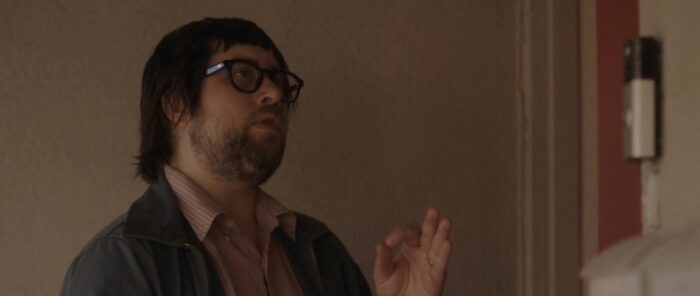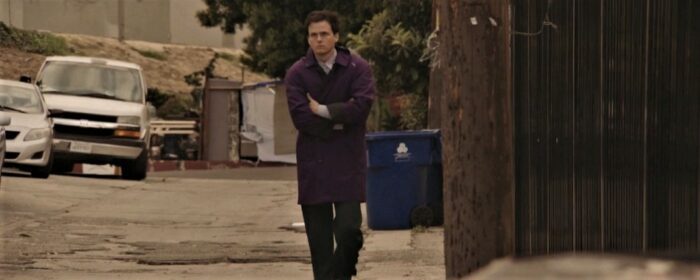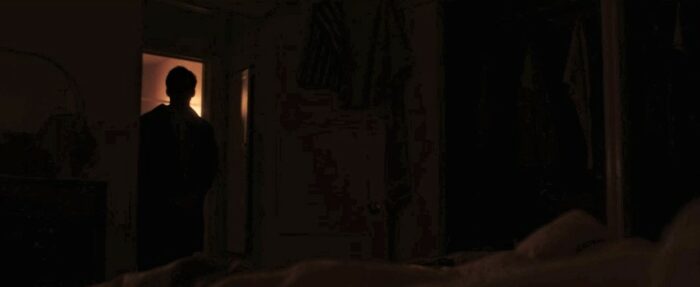In The Civil Dead, death is no escape from the living. The often-misunderstood notion hell is other people becomes painfully clear in this indie flick from director Clay Tatum. Written with costar Whitmer Thomas, the movie is a mashup of sorts spanning the spectrum from comedy to tragedy. At times it strives to misdirect as a heartwarming tale before plunging into some cringeworthy horror. Thankfully, The Civil Dead understands hell isn’t other people because people exist; it’s because of how we see ourselves reflected in them.
The story revolves around Clay played by Clay Tatum. He’s an aspiring photographer whose career isn’t going anywhere. While his wife is away on business, he encounters a familiar face, Whit, played by Whitmer Thomas. As these far from close friends reconnect, Whit reveals he recently died, became a ghost, and only Clay can see him.

However, although the film seems on track to follow a familiar formula, it eventually steers towards fresh territory. This isn’t the tale of a struggling artist who finds a lust for life again thanks to his ghost buddy. Unfortunately, despite running in some clever directions The Civil Dead stumbles a bit often.
The movie harks back to the mumblecore subgenre of indie filmmaking. As such, the aim is to offer audiences naturalistic acting emphasizing dialogue over plot. While this occasionally works, many conversations in The Civil Dead feel aimless. There’s an argument to be made characters are nervously avoiding a topic, but it typically comes across like performers rambling to kill time. Consequently, portions of The Civil Dead start to feel needlessly drawn out.
Repetition doesn’t help matters any. Certain moments tend to retread the same material. This means multiple scenes about topics which have already been well defined, and that would be alright if each exchange went in a new direction. As it is, The Civil Dead is often circling already established points instead of moving on.

It’s worth noting neither Clay nor Whit are particularly likable. That’s nice to see in a film written, starring, edited, and directed by the screenwriters. Instead of penning pleasing personalities, Clay Tatum and Whitmer Thomas took the satisfying risk of making their characters thoroughly unappealing losers.
Whit is a pathetic individual who quickly steps into creepy behavior, especially when trying to embrace his ghostly existence. Clay is a lazy man-child in the worst sense of the term. Neither are particularly admirable individuals, yet each contains an uncomfortable familiarity. Audiences may not (want to) see themselves in these characters, but they will see people they know. And the way Clay treats Whit will certainly resonate in ways people might not quickly admit to understanding.
It’s hard then to criticize either for having a lack of charm. The absence of it almost seems the point. Still, it’s not easy to watch someone like Whit, desperate for any human connection, grasping at the worst person possible to ease his loneliness. There’s a narrative daring there worth appreciating.

Those kinds of risks make The Civil Dead feel like a film full of potential. Some standard conventions are set up then subverted. Where other features might flinch toward more optimistic vistas, The Civil Dead chances a misanthropic view. Still, the movie knows well enough to attempt at alleviating pessimism with comedy.
Attempt is the right word because this is another stumbling point. There are moments of banter that are clearly meant to be comedic which fall painfully flat. Most jokes barely ever elicit more than a chuckle and those are the few which land. Overall, The Civil Dead feels like being cornered at a party by that person who can produce a smirk but is determined not to stop talking until a belly laugh ensues. I, personally, wanted the movie to stop trying to be funny, which it doesn’t do particularly well, and focus more on drama, which it does much better.
The Civil Dead does a marvelous job of maneuvering around its low budget. This doesn’t feel like a D.I.Y. indie flick. There are some solid shot choices maximizing the use of minimal spaces. Lighting, particularly night scenes, does a great job of establishing an unsettling atmosphere. Certain setups involving Whit really convey the idea of him being a ghost simply by the way he’s lit and standing in a scene.
Music is somewhat minimal but still used to great effect. At times, it can contrast with the intended mood. The soundtrack may sometimes seem more whimsical than the scene, but this juxtaposition works nicely. In addition, as is often the case with indie flicks, there aren’t any tunes instantly recognizable which is good. This allows songs to add to scenes without distracting from events, and some may even hook a fresh fan or two.
At the heart of The Civil Dead is a story about loneliness. Some will undoubtedly find it touching. Others will be put off by the unlikable main characters and what feels like an unnecessary length. Add on the fact the comedy here barely elicits an infrequent chuckle, and The Civil Dead can be a bit exhausting.
Yet, it contains a story that is powerfully honest. Plus, what’s on screen is a great example of how a low budget movie doesn’t have to seem filmed on busted phone cameras. Far, far from perfect, The Civil Dead is worth praising for taking certain narrative risks and honest displays of human failings.


